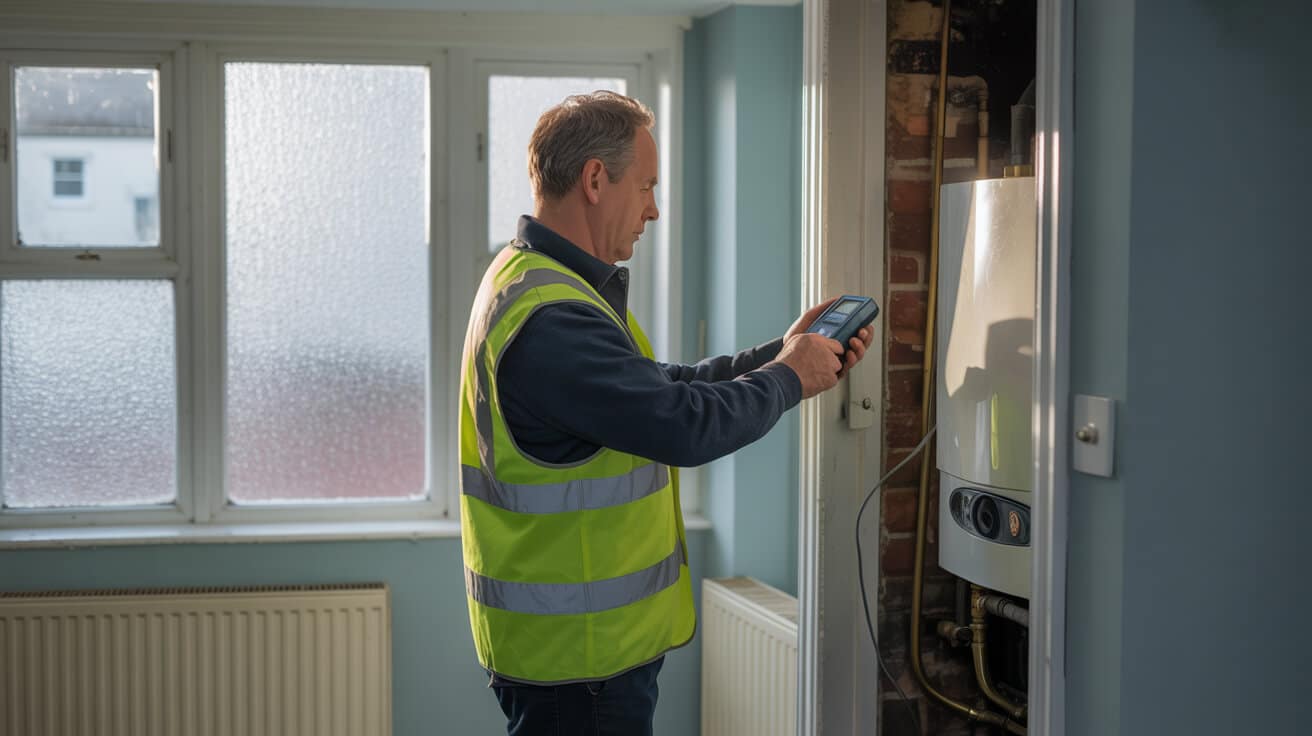 A Guide To Power Flushing Vs. Regular Boiler Servicing For System Longevity
A Guide To Power Flushing Vs. Regular Boiler Servicing For System Longevity

Why System Longevity Isn’t Optional: Protecting Comfort, Costs, and Confidence
Property heating isn’t just about keeping the thermostat happy one chilly night. Real leaders in property management know the real prize is durability: making sure your heating system is quietly delivering comfort, shielding you from chaos, and sidestepping those budget-draining breakdowns that always seem to show up uninvited. Every radiator in your place is connected to a web of pipes and parts that, if ignored, can take your bank account on a bad ride when you least expect it.
The worst failures are the ones you never saw coming because you trusted good enough instead of getting ahead.
This isn’t some compliance script. Proactive care is the difference between “always warm as promised” and apologies to tenants when the heat vanishes in December. Study after study shows just a little debris in the system can drop your boiler’s efficiency by up to 15%, swallowing more energy and nudging up every future repair risk (Cowley Heating). Skip routine maintenance and you’re betting on luck, not smart management.
But why do so many owners, even after scheduling that annual service, still get blindsided by major repairs? It’s because they don’t see the lines between what a standard checkup fixes—and what’s brewing quietly in the back of the system, just waiting to hit when you’re least ready. If you’re not clear what maintenance actually covers—or which signals mean your system needs more than the basics—you’re on thin ice.
Is an Annual Boiler Service Enough, or Does Your System Need More?

The law says landlords must schedule annual boiler servicing. For everyone else? It’s the bare minimum for protection: Gas Safe registered engineers run safety checks for leaks, emissions, and operation, confirm everything is running as it should, and keep your compliance and warranty status solid (HomeServe; Able MK).
Registered Gas Safe engineers inspect for leaks and emissions, ensuring safety compliance—required by law for landlords. ([HomeServe](https://www.homeserve.co.uk/heating/boiler-help-and-advice/understanding-your-boiler/boiler-service-checklist/?utm_source=openai))
Here’s the dangerous myth: that a yearly service is a system-wide pass. Not true. Boiler servicing focuses on the boiler itself, not the miles of pipes and every radiator downstream. Sludge, scale, trapped air—they’re not checked unless you ask. Meanwhile, warranty terms (read the fine print) often require not just a boiler stamp, but a system that’s clear and moving freely, too.
Repeat issues—cold patches, noisy radiators, odd system behaviour—aren’t solved by routine service. And pretending annual checks are “a reset button” is why so many properties lose money, tenants, or peace of mind. If you’re noticing these warning signs, you’ve got to go deeper than a surface-level tick box.
Where Regular Boiler Servicing Excels—and Where It Leaves Gaps

An annual service, done right, keeps the heart of your system in shape: inspecting for major leaks and faults, giving key components a clean, testing controls, and logging the lot for compliance (Energy Saving Trust). It’s warranty ammunition, insurance proof, and a layer of protection if anyone ever asks for records.
But here’s reality: servicing is mostly what happens inside the case. It doesn’t see into the pipes or radiators. If, despite those yearly appointments, your rooms aren’t heating right, radiators have cold zones even after bleeding, or you’re hearing more gushing, banging, or clicking, odds are debris in the system is holding you back (AC Heating & Plumbing). It’s like changing your car’s oil while ignoring a failing clutch.
Sludge causes cold spots and sounds within radiators—problems a basic service can’t address. ([AC Heating & Plumbing](https://ac-heating-plumbing.co.uk/blog/7-signs-your-central-heating-system-needs-a-power-flush/?utm_source=openai))
Don’t expect regular service visits to magick away years of built-up muck. They’re vital, but not miracle cures for every problem hiding under the surface. If your heating storey feels stuck on repeat, you need a different strategy.
What Distinguishes Power Flushing from Routine Service?

Power flushing is a system-wide reset—a full deep clean that reaches every pipe, radiator, and the inner shells of your boiler (NCS Property Maintenance). Unlike a routed annual service, this one uses specialist pumps and tailored chemicals, sending high-velocity flows through the whole circuit to shake loose years of rust, sludge, and scaling.
After power flushing, a 30-year-old radiator was restored to full output heat. ([NCS Property Maintenance](https://ncspm.co.uk/why-you-should-consider-a-power-flush-for-your-central-heating-system/?utm_source=openai))
If debris is allowed to build, you get a double hit: your system burns more gas to push water around, and vital boiler components have to work harder, shortening their life. This is why most engineers recommend pairing annual service with a power flush every 5–7 years, or sooner in older or high-use properties (Which?).
You can service a boiler to perfection, but if the system is silted up, you’re just kicking the can. Hidden blockages spell bigger repair headaches later—and mean you’re paying premium rates for part-time performance.
How Do You Spot When Power Flushing Is Essential—Not Optional?

Boiler problems rarely arrive without advance warning—they leave clues for the attentive owner or manager.
- Radiator bases are unresponsive: even after a bleed: classic sign of sludge.
- Pipes gurgle, clang, or bang: when the system fires: trapped air and debris slowing pursuit of heat ([AC Heating & Plumbing](https://ac-heating-plumbing.co.uk/blog/7-signs-your-central-heating-system-needs-a-power-flush/?utm_source=openai)).
- Rooms heat slower than they used to: even on mild days.
- Energy bills take a noticeable jump: —out of line with usage.
- Bleeding radiators produces dark, murky water: —your system is corroding inside ([HomeServe](https://www.homeserve.co.uk/heating/boiler-help-and-advice/boiler-flushing-guide/?utm_source=openai)).
- Pump or valve faults recur: more than once a season ([NCS Property Maintenance](https://ncspm.co.uk/why-you-should-consider-a-power-flush-for-your-central-heating-system/?utm_source=openai)).
Basic servicing never goes this deep. Ignore these signs and the risk isn’t just one chilly night—it’s a chain of breakdowns, leaks, or even boiler failure, all with a bigger bill at the end.
Major repairs often stem from untreated sludge, leading to higher long-term costs. ([NCS Property Maintenance](https://ncspm.co.uk/why-you-should-consider-a-power-flush-for-your-central-heating-system/?utm_source=openai))
If two or more symptoms show up, power flushing isn’t just recommended—it’s the next reasonable step to avoid total system chaos.
Boiler Service vs. Power Flush: What Happens and Who Needs Which?

Both are essential, but don’t mistake them for doing the same job.
What Happens in Boiler Servicing
- Full inspection: of visible parts, leaks, wear, and flue.
- Safety system tests: for gas, pressure, and emissions.
- Targeted cleaning: of vital boiler bits.
- Documentation: for your records, warranty, and compliance ([Able MK](https://ablemk.co.uk/the-complete-boiler-service-checklist-for-homeowners/?utm_source=openai)).
Just know that after the service, those radiators and pipes haven’t been touched.
What Happens During a Power Flush
- Specialist setup: Engineers hook up pumps and magnets to your system.
- Chemical cleansing: Forced-fluid and agent mixes break up rust, scale, and sludge.
- Debris capture: Filtration units grab what’s been loosened and washed away.
- Efficiency confirmation: Radiators and outputs are tested for heat gain.
- Final shot of inhibitor: Prevents instant reformation of new blockages ([HomeServe](https://www.homeserve.co.uk/heating/boiler-help-and-advice/boiler-flushing-guide/?utm_source=openai)).
DIY flushing is risky and often incomplete—specialist engineers prevent system damage and ensure proper results. ([HomeServe](https://www.homeserve.co.uk/heating/boiler-help-and-advice/boiler-flushing-guide/?utm_source=openai))
There’s a reason power flushing is left to experienced, certified professionals—it’s easy to do expensive damage if chemistry, pressure, or sequencing are wrong (AC Heating & Plumbing). Check credentials and demand evidence before signing off.
How to Pick the Right Engineer
- Annual service: Only consider Gas Safe, accredited professionals—no exceptions.
- Power flush: Look for clear training and track record. Genuine companies show before-and-after records, have customer reviews, and take time to explain their plan.
Cheap or fake “specialists” usually cost more, risk warranty voids, or create messes that take twice as long to fix.
Why Pairing Both Delivers the Best Results—and Real Savings

If you want to keep your system purring, treat annual servicing and power flushing as a duet, not rivals.
- Boiler service = legal safety net: , early problem-spotter, warranty protector.
- Power flush = system refresher: that clears decades off performance and slashes future failures ([Cowley Heating](https://cowleyheating.co.uk/blogs/top-5-signs-your-central-heating-system-needs-a-powerflush?utm_source=openai)).
- Add magnetic philtres: or liquid inhibitors after flushing to head off new debris.
- Insist on a line-by-line report: at every service—proactive engineers will highlight brewing issues.
Warranty terms often stipulate regular servicing and proof of system cleanliness. ([Energy Saving Trust](https://energysavingtrust.org.uk/boiler-service-explained/?utm_source=openai))
If you run a large, multi-unit, or tough-on-equipment property (student, HMO, rental blocks), dial up the care. Keep records bulletproof for happy tenants, stress-free inspections, and future resale value.
The All Services 4U Advantage: Why Compliance and Comfort Go Hand-in-Hand

Whether you own homes, flats, or manage office blocks, one thing’s now non-negotiable: your tenants and stakeholders expect relentless reliability. Partnering with All Services 4U is about more than ticking the compliance box:
- Only certified Gas Safe professionals: —every visit, every task, no shortcuts.
- Plain English, visual feedback: Expect honest photo reports, jargonless explanations, clear summary status.
- Records that stand up to inspection: Our digital logs protect you—no missing files when the insurance or HSE asks.
- Preventive lens: We don’t just fix—we flag, recommend, and build in efficiency upgrades.
- On-time, drama-evading service: Bookings run smooth, quotes don’t change mid-stream, and emergencies are met with cool heads and quick hands.
The real flex isn’t how quickly you react to problems—it’s that your team doesn’t let them materialise in the first place.
Invest in peace of mind instead of fighting recurring fires. When you show up for your assets, tenants, and yourself, the returns are measured in less stress, lower cost, and a reputation for getting it right.
Ready for the cycle of emergency repairs and oh-no moments to end? All Services 4U makes it happen—with open advice, honest quotes, and a long-haul mindset.
Speak to All Services 4U Today
Your heating system deserves more than wishful thinking. Whether you need a steady annual check, a system-deep power flush, or want fast, clear answers from a certified engineer, call All Services 4U. Protect your property’s comfort, extend your asset’s working life, and turn maintenance into an advantage—not just another cost. Let’s win back your peace of mind, today and for years to come.
Frequently Asked Questions
What subtle signals reveal your heating system needs a power flush instead of another routine service?
If your radiators still feel cold at the bottom after bleeding, or you notice persistent gurgling, slow heat-up across multiple rooms, or murky-brown water during venting, your system isn’t just experiencing minor air pockets—it’s showing clear evidence of deep internal sludge and rust, which only a power flush can truly remove. Traditional servicing checks combustion and basic function, but a power flush deeply cleanses the pipework and radiators, targeting issues that can’t be solved by simple bleeding or annual maintenance.
How do you distinguish minor from urgent power flush warnings?
- Persistent dirty or opaque water after multiple bleeds points to years of ignored debris.
- Recurrent system pressure loss or repeated boiler lockouts signal corrosion is impacting safe operation.
- If warmth stays patchy even after balancing, or you’re adding a new boiler onto old pipes, an all-systems flush is safest.
When the promise of comfort fades night after night, it’s not the weather—it’s what’s lurking unseen inside your own heating network.
What’s the most efficient action to take?
Book a qualified All Services 4U engineer to run system water quality checks and a fast-flow diagnostic. They’ll confirm whether a targeted repair suffices or a full flush is needed, using industry benchmarks to avoid over-servicing. By acting swiftly on these clues, you win back reliable warmth, cut future repair risk, and ensure your property meets both warranty and insurer expectations.
How do boiler servicing and power flushing combine to extend heating system life and efficiency?
Annual boiler servicing keeps your heart of the system beating safely—checking for combustion faults, gas leaks, and failed seals—while power flushing rejuvenates the whole vascular network by purging accumulated scale and sludge. Individually, each maintains part of the system. Together, they maximise heating quality, reduce long-term costs, and protect both property value and tenant safety.
What unique roles do each play?
- Boiler service: Maintains daily safe function and meets gas safety requirements yearly.
- Power flush: Restores flow through pipework and radiators, ensuring that cleaned energy gets where you want it.
- Without flushing, even a perfectly serviced boiler can’t compensate for blocked pipes or tired radiators. Ignoring annual service, conversely, risks breakdown, carbon monoxide danger, or insurance nullification. Combined, these strategies keep your entire heating “ecosystem” working efficiently in every winter.
Every year, unattended sludge quietly shortens your asset’s life—each skipped flush or service silently compounds inefficiency and repair costs.
What do manufacturers and insurers now require?
Major insurers (AXA, Zurich, Aviva) and all modern boiler warranties insist on annual servicing and strongly recommend power flushing every 5–7 years, or sooner if symptoms appear. Digital system logs from providers like All Services 4U create an evidence trail that protects clients if claims ever arise.
Why does power flushing cost range so much, and what strategies make it pay back faster?
Pricing varies due to property scale, radiator number, pipe complexity, and years of neglect—big homes with many zones, or “vintage” systems, almost always cost more to restore. While some owners see £350 quotes for flats, intricate sites can run £1,000+. That investment is recouped, typically within two winters, through lower gas bills (often 10–15% efficiency gains post-clean) and reduced emergencies.
| Service | Typical Cost | Recommended Interval | Core Benefit |
|---|---|---|---|
| Boiler Servicing | £80–£150 | Every 12 months | Keeps you legal and safe |
| Power Flushing | £350–£1,000+ | 5–7 years | Restores flow, lowers bills |
| Magnetic Philtre Add-on | £90–£200 | With flushing | Defends against new sludge |
A complete flush and philtre package pays for itself in fuel saved and failures avoided before your next major bill season.
What tactics secure the best long-term value?
- Bundle power flushing with your annual service—All Services 4U offers combined packages that often spot hidden issues in one visit.
- Insist on pre- and post-flush water sampling, so you know real improvement has occurred.
- Consider fitting a magnetic philtre during your flush; this protects your new “clean slate” and halves future cleaning needs.
By treating your heating as an investment—like a car needing oil and a full system clean—owners dodge the costliest callouts and enjoy reliable performance year after year.
What real-life risks come with power flushing and how is safety guaranteed for both assets and occupiers?
Power flushing is a forceful process. If done poorly by underqualified tradespeople, it could unearth or even create leaks in old, weakened pipework. But when managed by industry-accredited engineers, the risk is exceptionally low, and safety is tightly controlled with modern tools and strict protocols.
What measures ensure power flushing is risk-free?
- Only hire Gas Safe (or OFTEC, for oil) certified and power flushing trained professionals—look for full insurance and recent customer references.
- Always get a pre-flush inspection, so any fragile joints or historical repairs can be reinforced or noted before cleaning begins.
- Ensure inhibitor is added after work; this shields all fresh metal surfaces from rapid new corrosion, aligning with BS7593:2019 standards.
Your heating is a business asset, not just a home amenity—protect it with the level of care you’d expect for your most vital infrastructure.
Who benefits from tailored precautions?
Victorian conversions, listed buildings, and any property with unaccessed pipework or heritage features require careful, lower-pressure or sectional flushing with documentation. For blocks and commercial premises, smart staging prevents water ingress or valve faults and is best handled by experienced teams like All Services 4U.
How does neglecting power flushing or annual boiler care multiply risk and cost—especially given modern energy pricing?
Neglected systems cost more to run, trigger frequent breakdowns, and, in documented cases, double the likelihood of insurance claims being denied after incidents (Aviva Risk Matrix, 2022). Letting time slip by leads to silent corrosion, weak pumps, cold spots, and, for owners, the burden of unplanned capital outlay or unhappy tenants. Modern gas and electricity rates mean even a 10% efficiency gain translates to hundreds in savings per year.
What are the immediate and future costs of skipping vital maintenance?
- Skip annual servicing: Put yourself at risk of carbon monoxide hazards, boiler lockout, landlord fines, and voided warranties.
- Skip power flushing: Suffer uneven heating, radiators that never get hot, repeated pump troubles, and ongoing high bills.
- Neglect both: Prepare for emergency callouts, rising tenant turnover, and regulatory hassle if something goes wrong.
Consistent, scheduled care ensures every pound spent on fuel turns into comfort, reliability, and a positive reputation as a responsible property owner.
How do the best-run assets avoid these pitfalls?
Professional landlords, housing associations, and facilities managers embed both maintenance types into their operating budgets. Using digital certification and regular reminders, All Services 4U ensures clients are always audit-ready, compliant, and able to resolve disputes quickly—making maintenance not a stress, but a strategic advantage in cost and asset retention.
What new benchmarks define leading-edge property maintenance—and how are heating standards evolving into the future?
The last decade’s “tick the box” model is gone. Today’s high-standard asset maintenance leverages IoT-enabled thermostats, advanced water chemistry sensors, and magnetic filtration systems to shift from reactive “fix it when broken” to predictive “fix it before it breaks.” The buildings of the future will monitor their own heating health and alert you to risk before comfort drops.
What recent trends should smart owners adopt now?
- Connected, cloud-accessible thermostats and digital logs: enable remote auditing and unlock new utility discounts.
- Permanent magnetic philtres: trap every trace of rust, slashing future flush frequency and cost.
- Water quality monitors: turn hidden chemistry shifts into actionable, money-saving alerts—years before symptoms appear.
Modern engineering empowers you to make smarter, greener, lower-stress maintenance choices—for today’s bills and tomorrow’s compliance.
Why is the future of heating care digital and eco-conscious?
Strong new environmental rules, aggressive energy pricing, and heightened liability for unplanned downtime now make proactive, data-driven maintenance the new normal. With All Services 4U’s remote diagnostics, compliance certification, and consultative upgrades, your next service call is about confidence, not crisis.
Step ahead of risk by scheduling a digital property health check today—this is how top owners protect both cash flow and long-term asset value while raising their ESG profile.



